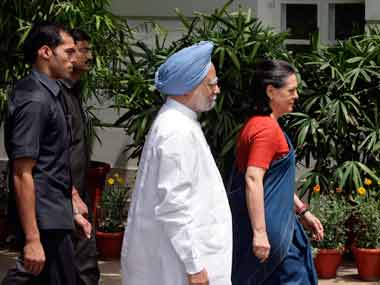It’s easy for the Congress, as its leaders have frequently done, to blame the compulsions of coalition politics for the UPA government’s inability to press ahead with any meaningful progress on economic reforms.
Prime Minister Manmohan Singh has trotted out that excuse for everything from the mammoth 2G scam to the government’s rollback of fuel prices and the proposal for FDI in retail. Finance Minister Pranab Mukherjee too has said that he had to be "extra careful" while presenting his weak-kneed budget, given the political reality that confronts the government today.
“Knowing the mood of the persons who matters here (in Parliament), I had to be extra careful and I had to make my colleagues extra careful. Therefore, many of things which could have been done, rather should have been done, could not be done just at the time of the Budget,” Mukherjee said.
[caption id=“attachment_249348” align=“alignleft” width=“380” caption=“It was the Congress’ own lack of political imagination - and lack of faith in itself - that rendered it vulnerable to the blackmail. Reuters”]  [/caption]
It’s true, of course, that allies like the Trinamool Congress and the DMK, which have elevated political blackmail to a high art, have effectively checkmated the Congress by their repeated brinkmanship games. But in the first place, it was the Congress’ own lack of political imagination - and lack of faith in itself - that rendered it vulnerable to the blackmail. The ideologically fickle party allowed itself to be pushed around by far weaker allies because, enamoured by its own dynastic obsession, it has forgotten its own history of pressing ahead with reforms in far more exacting economic and political circumstances.
Even in the UPA’s earlier incarnation, when it was supported by the Left parties, the instrument of a Common Minimum Programme that they ironed out gave at least a semblance of order to policy orientation, although even then, the Congress held itself back from doing as much as it could have.
With all their faults and ideological rigidity, the Left parties were at least consistent in their position on political and economic issues: even when they withdrew support in 2008 to the UPA government on the civilian nuclear agreement with the US, they were being faithful to their ideological position, however much of a losing proposition it turned out to be.
Soon after the UPA 2 government was elected to power in May 2009, some of the allies pressed for a similar Common Minimum Programme. Wiser after its experience with the Left parties, the Congress did not commit itself to one, in the belief that it would be cramped for space if it signed on for one.
Yet, its own (in)action over the past three years on virtually every major policy issue - and its lack of coherence in its policy formulations - betrays the fact that it is the Congress’ own ideological bankruptcy, which manifests itself in reflexive, knee-jerk do-goodism masquerading as “social justice” that is to blame.
In just eight years, writes Shekhar Gupta in The Indian Express, the UPA has “completely changed the reformist mood to a dark, negative povertarian discourse of the seventies.”
Why did this transformation happen? Why did the reformers of 1991, who faced an even more volatile political situation, and were part of a minority government, fail from 2009 until today, a period when the coalition was considerably better off and could be said to have secured a mandate to be bold?
The reasons lie in the accursed dynastic politics of the Congress - rather than in the limitations of coalition politics. There is quite honestly no one within the Congress - not even the erstwhile reformers who have been enfeebled - who will intellectually challenge the dominant left-leaning, bleeding-heart narrative trotted out by both Sonia Gandhi and Rahul Gandhi - and advanced by the National Advisory Council cabal that serves as Sonia’s kitchen cabinet.
Even today, NAC member Harsh Mander’s only grievance with the budget that Pranab Mukherjee presented on Friday is that it doesn’t go far enough to advance welfare politics. “It is disappointing,” writes Mander, “that the government has not taken any steps to provide for the Food Security Bill… in this budget.”
There may be no such thing as a free lunch, but the Congress is no less committed to the ill-conceived proposal. And for all of Pranab’s claims to a commitment to fiscal prudence, the budget is only a smoke-and-mirrors show that hides the deeper mess that awaits the Indian economy.
For sure, allies like the Trinamool and the DMK may have shamefully cramped the political space for the Congress to operate. But the bigger share of the blame rests with the ideologically bankrupt Congress, which has effectively silenced all reformist voices within it at the altar of dyastic politics, and which today reflects a fear of even its own shadow that freezes it into inaction.


)
)
)
)
)
)
)
)
)



